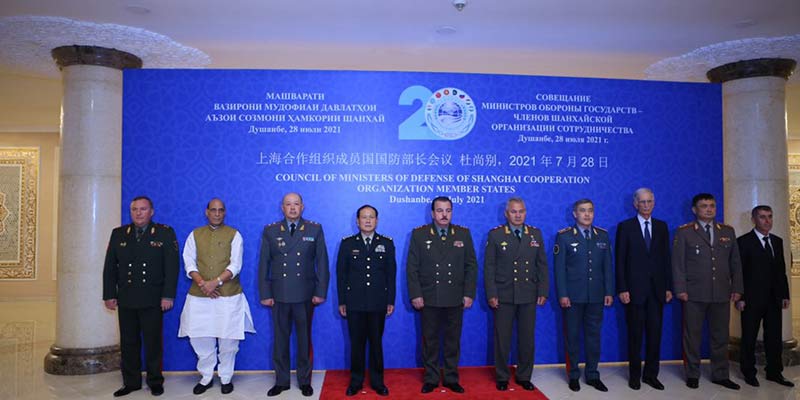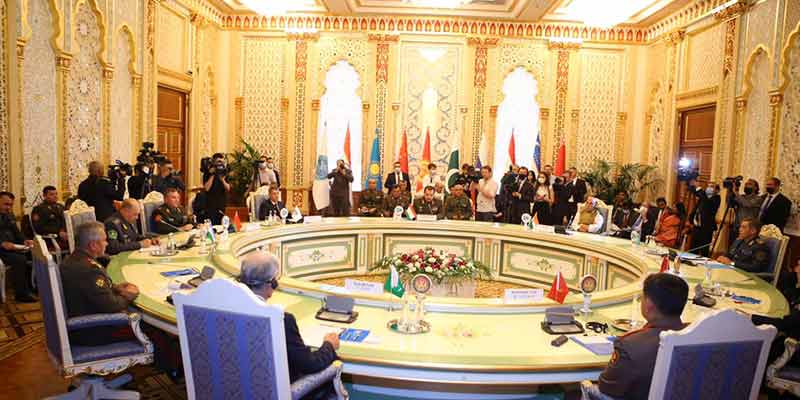- World
- Jul 30
Explainer / 20 years of the SCO
Terrorism is the most serious threat to international peace and security and support to any acts of terror is a crime against humanity, Defence Minister Rajnath Singh said at a conclave of the Shanghai Cooperation Organisation (SCO) in Dushanbe, Tajikistan.
He also congratulated Member States of the SCO on successful completion of 20 years of its establishment.
What is the SCO?
• The Shanghai Cooperation Organisation (SCO) is an intergovernmental organisation founded in Shanghai on June 15, 2001. It was founded by the presidents of China, Kazakhstan, Kyrgyzstan, Russia, Tajikistan and Uzbekistan.
• These countries, except for Uzbekistan, had been members of the Shanghai Five group, formed on April 26, 1996 with the signing of the Treaty on Deepening Military Trust in Border Regions.
• The SCO Charter was signed during the St Petersburg heads of state meeting in June 2002 and entered into force on September 19, 2003. This is the fundamental statutory document which outlines the organisation’s goals and principles, as well as its structure and core activities.
• The Heads of State Council (HSC) is the supreme decision-making body in the SCO. It meets once a year and adopts decisions and guidelines on all important matters of the organisation.
Who are the members of SCO?
• The SCO currently comprises eight Member States (China, India, Kazakhstan, Kyrgyzstan, Russia, Pakistan, Tajikistan and Uzbekistan), four observer states interested in acceding to full membership (Afghanistan, Belarus, Iran and Mongolia) and six dialogue partners (Armenia, Azerbaijan, Cambodia, Nepal, Sri Lanka and Turkey).
• India, Iran and Pakistan were admitted as observers at the 2005 summit. On June 9, 2017, at the historic summit in Astana, India and Pakistan officially joined the SCO as full-fledged members.
• The SCO has two permanent bodies — the SCO Secretariat in Beijing and Executive Committee of the Regional Anti-Terrorist Structure (RATS) in Tashkent.
• The chairmanship of the SCO is by rotation for a year by the Member States.
The SCO’s main goals are:
• Strengthening mutual trust and neighbourliness among the Member States.
• Promoting their effective cooperation in politics, trade, economy, research, technology, culture, education, energy, transport, tourism, environmental protection and other areas.
• Making joint efforts to maintain and ensure peace, security and stability in the region.
• Moving towards the establishment of a democratic, fair and rational new international political and economic order.
India and the SCO
• India was made an observer at the July 2005 Astana Summit and has generally participated in the ministerial-level meetings of the grouping, which focus mainly on security and economic cooperation in the Eurasian region.
• India and Pakistan became its permanent members in 2017.
• India has shown keen interest in deepening its security-related cooperation with the SCO and its Regional Anti-Terrorism Structure (RATS), which specifically deals with issues relating to security and defence.
Significance of the SCO
• The SCO was established as a multilateral association to ensure security and maintain stability across the vast Eurasian region, join forces to counteract emerging challenges and threats, and enhance trade, as well as cultural and humanitarian cooperation.
• The SCO, seen as a counterweight to NATO, has emerged as one of the largest transregional international organisations.
• The entire structure of the organisation is designed to generate multilateral partnerships to assist sovereign members in coordinating strategies and approaches to solving pressing international issues and meeting regional needs.
• It also provides an opportunity for Member States to concentrate their efforts on common goals in accordance with the principles of voluntary cooperation and equitable distribution of responsibilities.
• The region comprising SCO Member States — stretching north to south from the Arctic to the Indian Ocean, and east to west from Lianyungang in China to Kaliningrad in the Russian Federation — home to almost 44 per cent of the world’s population, poses the fundamental task of collectively maintaining stability and effectively counteracting security threats across our respective territories, the responsibility of what is currently the largest regional organization on Earth.
• By consolidating four nuclear powers — almost half of the world’s nuclear States — into a single regional organization, SCO serves as an additional deterrent within the system established to maintain the world’s strategic balance of power and political stability.
• The Regional Anti-Terrorist Structure (RATS) has been very effective in tackling terrorist activities. Under RATS coordination, the authorities of SCO member States have managed to prevent terrorist attacks while still in the planning stages, averted crimes of terrorist and extremist nature, and neutralized terrorist training camps and members of international terrorist organisations.
• The SCO has established relations with the UN in 2004 (where it is an observer in the General Assembly), Commonwealth of Independent States in 2005, ASEAN in 2005, the Collective Security Treaty Organisation in 2007, the Economic Cooperation Organisation in 2007, the UN Office on Drugs and Crime in 2011, the Conference on Interaction and Confidence-Building Measures in Asia in 2014, the UN Economic and Social Commission for Asia and the Pacific in 2015 and the UNESCO in 2018.
Manorama Yearbook app is now available on Google Play Store and iOS App Store


